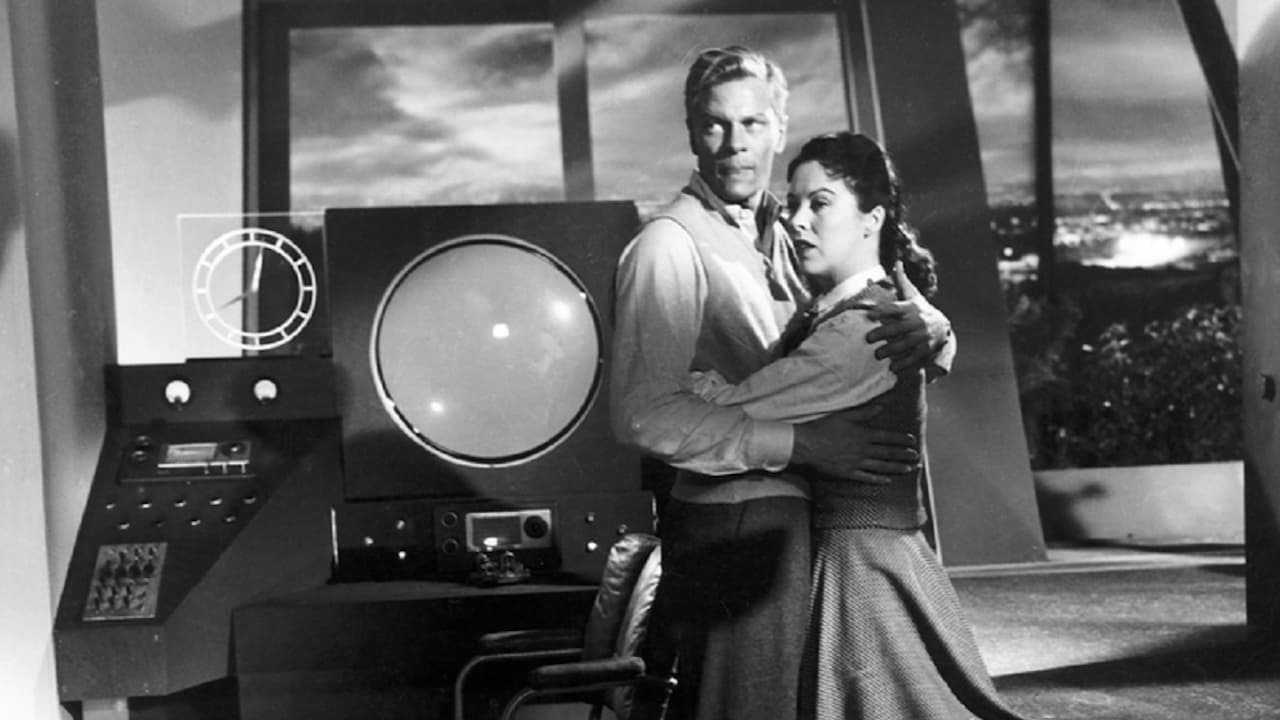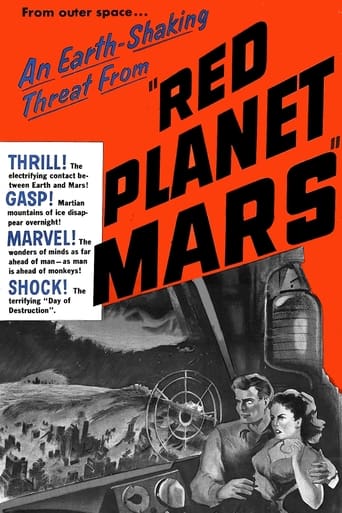

a film so unique, intoxicating and bizarre that it not only demands another viewing, but is also forgivable as a satirical comedy where the jokes eventually take the back seat.
... View MoreOne of the best movies of the year! Incredible from the beginning to the end.
... View MoreAmazing worth wacthing. So good. Biased but well made with many good points.
... View MoreThe movie turns out to be a little better than the average. Starting from a romantic formula often seen in the cinema, it ends in the most predictable (and somewhat bland) way.
... View MoreI never saw this movie before, quite outdated now, but gives a good look of a bit of the cold war and science fiction. This has mission impossible Peter Graves in it. Much better acting than todays junk.although comet shows some of these old sci fi, some are quite interesting. this one was pretty good.
... View MoreAn American scientist is able to contact and communicate with Mars with shattering political, economic, and spiritual repercussions.I liked that they referenced Franz Calder, a Nazi scientist that apparently helped connect Mars and Earth. I do not know if Calder is real (I suspect not), but this seemed like a reference to von Braun, the Nazi scientist who invented the rocket. Indeed, we owe our space exploration to the Nazis in a round-about way.I am somewhat confused by the idea that if coal mines and oil wells are no longer useful that the next generation will not have jobs. I understand that the oil and coal companies would not want to lose their lucrative business, but I am unclear how this affects potential employees that have not even started yet. If all energy were free, there would still be other jobs -- the money not spent on energy would go to other, more leisurely pursuits.
... View MoreIf Red Planet Mars is not at the top of the approved list of films for the 700 Club than Pat Robertson missed a bet. But ironically the film did call something quite right, the fall of the 'godless' Soviet Union.Peter Graves and Andrea King are a pair of husband and wife scientists who manufacture something called a hydrogen valve. The presence of pure hydrogen allows for ordinary radio waves to magnified to an exponential distance. So Graves decides to see if he can contact the Red Planet Mars and find out if there is any life on it once and for all.The hydrogen valve is not of his invention, the blueprint was discovered in the Nazi archives of a missing scientist played by Herbert Berghof and Graves followed his work. Berghof like all good former Nazis is hiding out in South America, in a remote place in the Andes where the famous Christ of the Andes looks down on him. By the way the real Christ of the Andes statue does not look like that at all, what the producers used was a snowbound replica of the famous Christ statue that overlooks Rio De Janeiro harbor.Berghof is in the pay of the Russians, but he's got no love for them either, he remembers both America and the Soviets joining forces to sink his beloved Fuehrer, so Berghof wants payback for both. Economic messages showing that USA technology is woefully out of date send our capitalist economy into collapse. But later messages from Mars of a religious nature send the Soviet Union into something very similar to what happened after the Berlin Wall came down. Is all this product of Berghorf's fevered brain?For that you have to watch the film which during the Cold War was the wish dream of every anti-Communist in the world. The film is part science fiction part fantasy and all Cold War propaganda. But in fact the Soviet Union did fall and the Russian Orthodox Church in this film took the political reins of the country. They didn't do it in real life, but their influence is felt and the reactionary policies they do endorse aren't any better for their own people than the sterile political system they helped overthrow.Interesting also that in 1952 there is no question that the movie would show Christianity as the one and only true religion out there. If someone were to remake that film now, a more pluralistic society would be shown to be the Utopian one.Red Planet Mars is one of the Cold War era films that is now a curiosity to be viewed and studied as a symbol of American attitudes during the Fifties.
... View MoreNo sense carrying on about this movie.One of the Hollywood moguls once said that if you want to send a message, call Western Union. The producers, director, and writers didn't take the advice because they've put together a movie that is an insult to the intelligence and taste not only of all human beings but all primates, all the way down to lemurs and tarsiers and marmosets. Maybe lower still. A platypus might bristle.Peter Graves, tall, robust, handsome, is an American electronic specialist who manages to contact Mars by radio and begins to get messages in return. The Martians, it seems, have no need for oil or any source of energy other than cosmic. (The energy industries implode all over the world.) The average life span on Mars is 300 years. (Doctors jump out of windows.) They can feed a million people from food grown on one acre of ground. (Commodities fall through the floor.) But then, with the global economy in collapse, the messages begin to get spiritual, so to speak. The Martians begin babbling about their Supreme Leader and his sayings, which, it develops, are from the sermon on the mount.I'll cut this short to spare you some of the pain I experienced while watching goggle-eyed as this execrable piece of trash unrolled on the screen.The world's population now believes in God and begins going to church. (Cue the bells and the heavenly choirs.) The good folks of Russia rise up to worship on their own, are mowed down by cackling Soviet soldiers, but overthrow their government and establish a theocracy in pursuit of world peace.There's a twist or two at the end that no power on Earth, or on Mars either, could get me to reveal, so I'll just finish by saying Graves and an arch enemy perish in a hydrogen explosion, for which I was grateful since it meant the end of the movie was at hand.I often hear that there are some movies that are so bad, they're good. "Plan 9 From Outer Space" is often given as an example. So is John Wayne's "The Conqueror." Such claims prompt me to ask, "Has anyone ever actually sat through any of this junk?" If so, and if they've found it rewarding, they should definitely catch "Red Planet Mars."
... View More